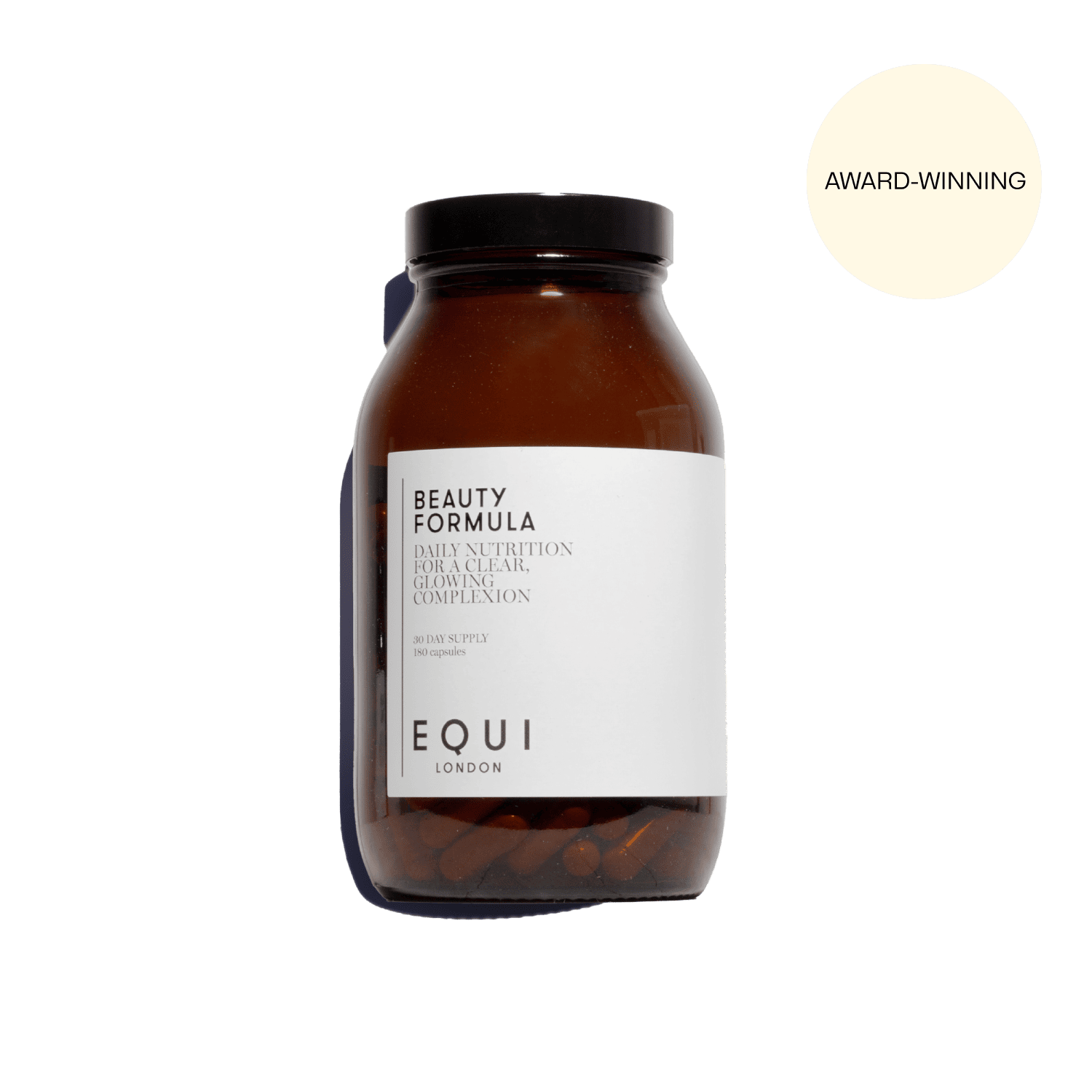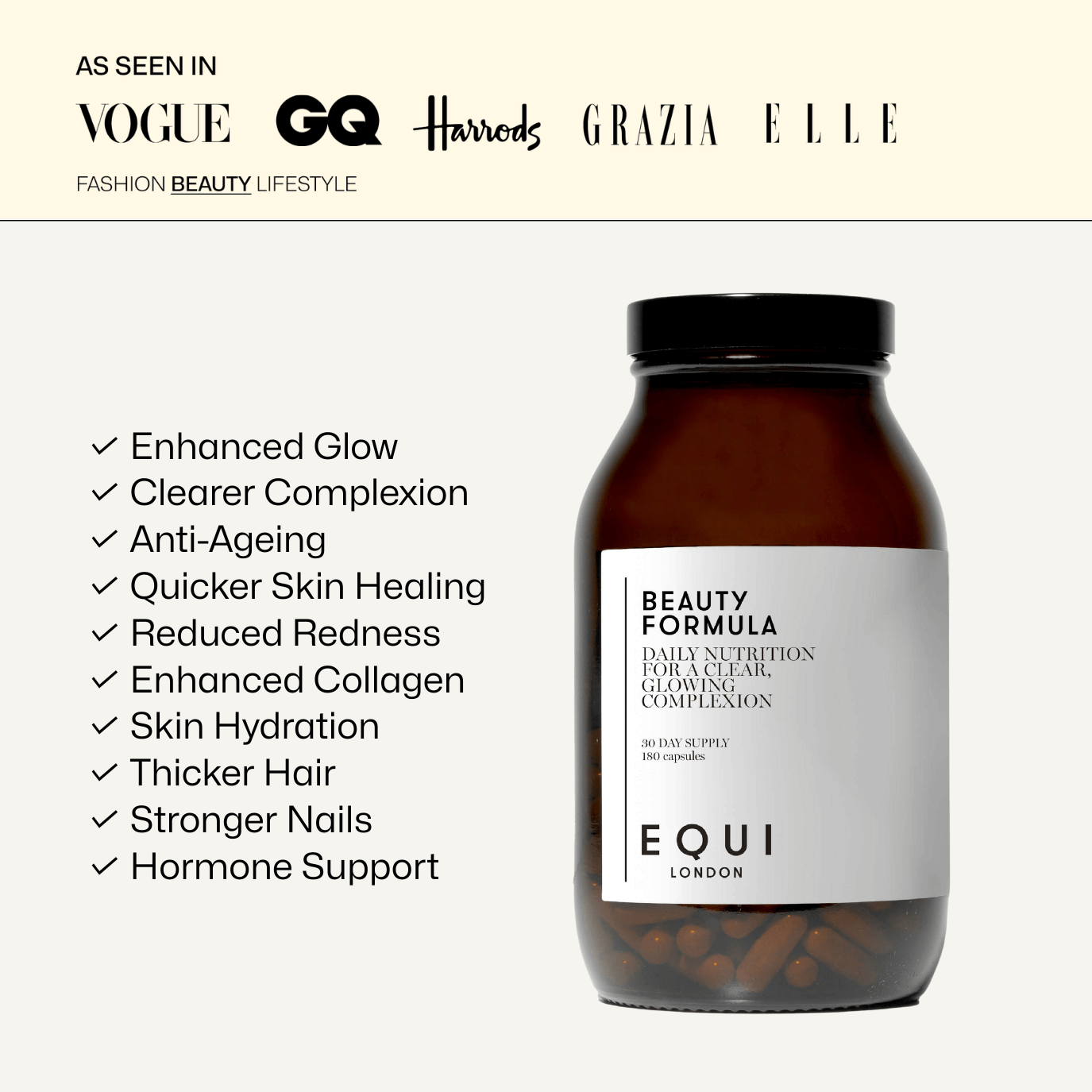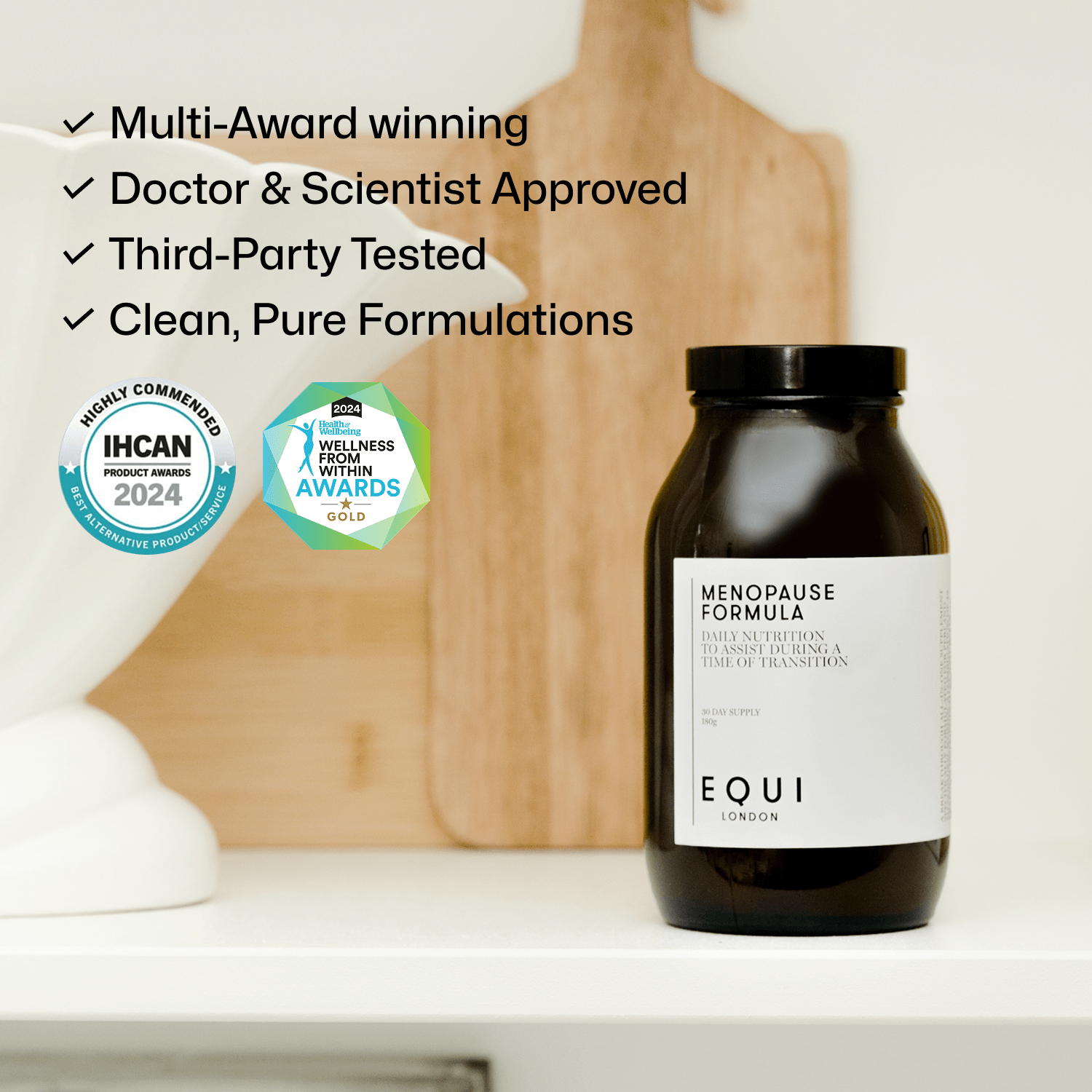
Welcome to our latest EQUI blog, where we explore the vital role of Ferrochel® Iron Bisglycinate present in our Formulas in promoting health and well-being, particularly for women. You probably know that iron is a crucial nutrient, essential for numerous bodily functions, yet supplementation in some forms can cause digestive upset. However, not all iron supplements are created equal - in this comprehensive guide, we delve deep into the benefits of Ferrochel® Iron Bisglycinate, a superior form of iron that stands out for its exceptional bioavailability and gentleness on the digestive system. Iron plays a pivotal role in our bodies, most notably in the formation of haemoglobin, a protein in red blood cells responsible for transporting oxygen throughout the body. Adequate iron levels are essential for maintaining energy, cognitive function, and overall vitality. Traditional forms of iron are often associated with unpleasant side effects like nausea and constipation, making them less than ideal for many individuals. This is where Ferrochel® Iron Bisglycinate comes into play. This advanced form of iron is designed for optimal absorption and minimal gastrointestinal discomfort, making it a game-changer in iron supplementation.
Our first topic delves into the superiority of Ferrochel® Iron Bisglycinate over other iron forms. We'll explore its unique chemical structure, which allows for better absorption by the body and significantly reduces the common side effects associated with iron supplements such as ferrous sulphate. This section will highlight scientific studies demonstrating the effectiveness and tolerability of Ferrochel®, providing a solid foundation for its use in EQUI Formulas. Next, we will explore the increased iron needs of women. Factors such as menstruation, pregnancy, and physical activity can significantly elevate our iron requirements. Our blog will shed light on this, offering insights into how we can ensure we are meeting iron needs effectively. We aim to empower you with the knowledge to manage health proactively, emphasising the importance of iron in various stages of life! Then we'll explore the often-overlooked connection between iron deficiency and beauty concerns. Iron's role in combating fatigue, promoting healthy skin, and reducing hair loss and under-eye bags is a vital aspect of beauty and wellness. We'll delve into how maintaining optimal iron levels can enhance not just physical health but also contribute to a radiant, vibrant appearance! Finally, we'll discuss the synergistic relationship between iron and other key nutrients that enhance its absorption and efficacy. Vitamins and minerals such as Vitamins C, A, folate and copper play a critical role in maximising the body's ability to utilise iron. We'll examine how these nutrients work in tandem with iron to promote optimal health, drawing on the latest nutritional research. Throughout this blog, our goal is to provide a thorough, evidence-based explanation of why our Ferrochel® Iron Bisglycinate is so good. From its superior absorption to its impact on women’s health and beauty concern,s we aim to highlight why this form of iron is a cornerstone ingredient in EQUI Formulas. Join us as we uncover the multifaceted benefits of Ferrochel® Iron Bisglycinate and its vital place in your wellness journey!
The Superiority of Ferrochel® Iron Bisglycinate
Ferrochel® Iron Bisglycinate, a patented form of iron found in all EQUI Formulas, has emerged as a superior option in iron supplementation, addressing many drawbacks associated with traditional iron forms. This form of iron is distinguished by its unique chemical structure, high bioavailability, and reduced gastrointestinal side effects, making it a preferred choice for individuals looking to boost their iron levels effectively and comfortably. Firstly, Ferrochel® is a highly bioavailable form of iron, boasting at least twice the bioavailability of traditional iron salts. This increased bioavailability means that the body can absorb and utilise more iron from Ferrochel® compared to other forms! In fact, The World Health Organization (WHO) recognises that Iron Bisglycinate Chelate, the category to which Ferrochel® belongs, is 2-3 times better absorbed, particularly in the presence of anti-nutrients such as phytates, which are commonly found in plant-based foods. These anti-nutrients found in foods such as wholegrains, nuts and seeds can inhibit the absorption of iron, but the unique process of producing Ferrochel® minimises this interaction. Research supports this, showing that iron bisglycinate is less affected by dietary factors that typically hinder iron absorption (1).
What’s more, Ferrochel’s small molecular size allows it to remain intact throughout the gastrointestinal (G.I.) tract, leading to optimal absorption and fewer gastrointestinal issues. Traditional iron supplements such as ferrous sulphate often cause side effects like constipation and nausea due to their larger size and reactivity in the G.I. tract. However, the chelation process in Ferrochel® results in a smaller, more stable molecule that is gentler on the digestive system. Clinical data has shown that consumers prefer iron bisglycinate chelate over alternative iron salts due to the lower number of side effects, indicating its tolerability and ease of use (2). Finally, backed by extensive scientific research, Ferrochel® has demonstrated its efficacy in improving iron levels and overall health for many years. Its ability to effectively increase iron levels without the common adverse effects associated with other forms makes it an ideal choice for women. Research confirms that iron bisglycinate chelate is effective in improving iron status, particularly in those at risk of deficiency (3). This leads us nicely onto the next section, where we will explore what might make us more at risk of iron deficiency.
Understanding Our Increased Iron Needs
Women's iron requirements are distinctively higher and more complex due to various factors. The obvious ones being menstruation and pregnancy, but did you know that it’s also down to how much physical activity we are doing? Understanding our unique needs is crucial for maintaining optimal health and preventing iron-deficiency anaemia, a condition that affects a significant proportion of us. Menstruating women experience regular iron loss through menstrual blood, which can significantly contribute to decreased iron levels. Each menstrual cycle can lead to the loss of 15-30 mg of iron. For women with heavy menstrual bleeding, this loss is even more pronounced. This can be a common concern during the reproductive years and even into perimenopause when some women may find their bleeding is heavier or lasts longer than before. Regular monitoring and appropriate iron supplementation can be critical for women experiencing heavy menstrual periods. The importance of supplementing iron in women, is why we have ensured that ALL our Formulas contain Ferrochel®.
When it comes to pregnancy, this significantly elevates our iron requirements. The World Health Organization (WHO) reports that 37% of pregnant women worldwide suffer from anaemia. During pregnancy, we need more iron to support the growing foetus and to accommodate an increase in her blood volume. Moreover, iron is essential for the development of the placenta and the foetus. Pregnancy Formula, which includes an optimal level of 20mg Ferrochel® Iron Bisglycinate, with its high bioavailability, is particularly beneficial during this time. It ensures that more iron reaches the bloodstream, leading to a faster and more effective increase in haemoglobin levels. In fact, a study found that daily iron supplementation significantly improved haematological indicators in pregnant women (4), underscoring the importance of adequate iron intake during pregnancy.
A less commonly talked about reason for iron supplementation is due to the demands of rigorous physical activity which can increase iron requirements. Experts estimate that the iron requirement for athletes is increased by up to 70%. The increased need is due to several factors, including iron loss through sweat, the gastrointestinal tract, and the breakdown of red blood cells. Intense physical activity can lead to a phenomenon known as “footstrike homolysis, sometimes called ‘runners anaemia’, where red blood cells are damaged during repetitive foot strikes. Research confirms that those partaking in rigorous exercise such as long distance running, are at a higher risk for iron deficiency and that regular monitoring of iron status is crucial (5).
A women's unique iron needs, influenced by menstruation, pregnancy, and physical activity, necessitate a careful approach to iron supplementation. Ferrochel® Iron Bisglycinate, with its exceptional bioavailability, offers an effective solution to meet these heightened requirements. Ensuring adequate iron intake is not just about preventing anaemia; it's about supporting overall health and well-being across various life stages and physical demands.
Struggling With Dull Skin & Hair Loss?
Iron deficiency, one of the most common nutritional deficiencies worldwide, has implications not only for health but also for appearance. Manifesting as fatigue, dull skin, hair loss, and under-eye bags, iron deficiency can significantly impact our outer beauty as well as inner health. Iron plays a crucial role in maintaining energy levels, skin health, and overall appearance, making it a vital component in our beauty and wellness routines and EQUI Formulas! Iron is essential for the production of haemoglobin, a protein in red blood cells that transports oxygen throughout the body. A deficiency in iron leads to reduced oxygen delivery to the body's tissues, resulting in fatigue, one of the most noticeable symptoms of iron deficiency. This lack of energy can significantly affect daily activities and overall quality of life. Iron also plays a role in skin health and deficiency can lead to pale and dull-looking skin, as the reduced haemoglobin levels cause less blood flow to the skin, depriving it of its natural colour and ability to glow. Additionally, iron is important for the repair and regeneration of skin cells. Research highlights the importance of micronutrients, including iron, in skin health and appearance (6). In addition to dull skin, under-eye bags and dark circles can be a sign of iron deficiency. The reduced haemoglobin levels in iron-deficiency anaemia can cause the skin under the eyes to appear more translucent and bluish due to the visible blood vessels beneath. Finally, Iron deficiency is also a well-known cause of hair loss, particularly in women. Hair follicle cells have a rapid turnover and require a constant supply of nutrients, including iron. When iron levels are low, hair growth can be impacted, leading to increased hair shedding and reduced hair volume. The link between iron deficiency and hair loss, emphasises the importance of adequate iron levels for maintaining hair health (7). So, the implications of iron deficiency extend beyond health and into our beauty and wellness considerations. The role of iron in maintaining energy, skin health, hair vitality, and reducing under-eye bags positions it as a crucial nutrient in beauty and wellness routines. Ferrochel® Iron Bisglycinate, given its superior attributes, stands out as an effective solution for addressing these concerns.
Ferrochel® Iron Bisglycinate, with its high bioavailability and reduced gastrointestinal side effects, is an ideal form of iron supplementation. Its ability to effectively increase iron levels without the common side effects associated with other iron forms is why you will find this form in ALL EQUI Formulas, with optimal levels in Pregnancy Formula. By addressing iron deficiency, Ferrochel® can help improve energy levels, skin radiance, hair health, and reduce the appearance of under-eye bags, thereby enhancing overall beauty and wellness. All you need to do is find your Formula. Take our quiz here.
How To Enhance Iron Absorption
Iron is a vital mineral for the body, however, its absorption and efficacy are significantly influenced by the presence of other nutrients. Vitamins and minerals like vitamin C, vitamin A, folate, and copper play pivotal roles in enhancing iron absorption and utilisation. Vitamin C, is well-known for its ability to enhance the absorption of iron. It converts iron into a form that is more easily absorbed by the body. This is particularly important for non-haem iron, the type of iron found in plant-based sources, making it more soluble and easier for the intestines to absorb. Pairing citrus fruit with plant-based sources of iron such as chickpeas and lentils will help aid absorption. Another vital nutrient, vitamin A found in meat, liver and orange plants such as squash plays a crucial role in iron metabolism by aiding in the mobilisation of iron from its stores. It is essential for the maintenance of iron homeostasis in the body. Insufficient levels of vitamin A may lead to iron deficiency symptoms even when iron intake is adequate. Research indicates that vitamin A supplementation can improve iron status and reduce the risk of anaemia, particularly in populations where deficiencies in both nutrients are common (8).
Folate, or Vitamin B9, is vital for the production and maturation of red blood cells. It works alongside iron in the formation of haemoglobin, the protein in red blood cells that carries oxygen throughout the body. Folate deficiency can lead to a type of anaemia that is similar to iron-deficiency anaemia. The synergy between folate and iron is crucial for the optimal production of healthy red blood cells. Good food sources include dark green leafy veg, potatoes and pulses. Meanwhile, less talked about nutrient copper is another essential mineral involved in iron metabolism. Like vitamin A, it aids in the mobilisation of iron from stores and is integral to the process of incorporating iron into haemoglobin. Copper deficiency can lead to iron storage disorders and anaemia, as iron cannot be effectively utilised without adequate copper. Oysters and other shellfish, wholegrains and nuts are all good food sources.
The absorption and efficacy of iron in the body are significantly enhanced by the presence of these crucial nutrients. Vitamin C, A, folate, and copper each play a specific role in iron metabolism, ensuring that the body can efficiently utilise iron. This synergy highlights the importance of a holistic approach to nutrition, where a balance of multiple nutrients is essential for optimal health.
EQUI Formulas, whilst specifically supporting your current goals whether that be beauty, weight loss, pregnancy, perimenopause/menopause or general wellness, all contain an advanced multivitamin and mineral complex, which is a female-specific spectrum of bio-available vitamins and minerals including vitamin C, A and a B complex. Pregnancy Formula contains a small dose of copper, where needs are increased however this is best sourced from food. To shop all Formulas, head here.
References
- Gulec, S., Anderson, G.J., and Collins, J.F., (2014). Mechanistic and regulatory aspects of intestinal iron absorption. American Journal of Physiology-Gastrointestinal and Liver Physiology, 307(4), G397-G409.
- Cancelo-Hidalgo, M.J., Castelo-Branco, C., Palacios, S., Haya-Palazuelos, J., Ciria-Recasens, M., Manasanch, J., and Pérez-Edo, L., (2013). Tolerability of different oral iron supplements: a systematic review. Current Medical Research and Opinion, 29(4), 291-303.
- Szarfarc, S.C., de Cassana, L.M., Fujimori, E., Guerra-Shinohara, E.M., and de Oliveira, I.M., (2001). Relative effectiveness of iron bis-glycinate chelate (Ferrochel) and ferrous sulfate in the control of iron deficiency in pregnant women. Archives of Latinoamerican Nutrition, 51(1 Suppl 1), 42-47.
- Pena-Rosas, J.P., and Viteri, F.E., (2009). Effects and safety of preventive oral iron or iron+folic acid supplementation for women during pregnancy. The Cochrane Database of Systematic Reviews, (4), CD004736.
- Sim, M., Dawson, B., Landers, G., Trinder, D., and Peeling, P., (2014). Iron regulation in athletes: Exploring the menstrual cycle and effects of different exercise modalities on hepcidin production. International Journal of Sport Nutrition and Exercise Metabolism, 24 (2), pp. 177-87.
- Guo, E.L., and Katta, R., (2017). Diet and hair loss: effects of nutrient deficiency and supplement use. Dermatology Practical & Conceptual, 7(1), 1-10.
- Trost, L.B., Bergfeld, W.F., and Calogeras, E., (2006). The diagnosis and treatment of iron deficiency and its potential relationship to hair loss. Journal of the American Academy of Dermatology, 54(5), 824-844.
- Semba, R.D., and Bloem, M.W., (2002). The anemia of vitamin A deficiency: epidemiology and pathogenesis. European Journal of Clinical Nutrition, 56(4), 271-281.












